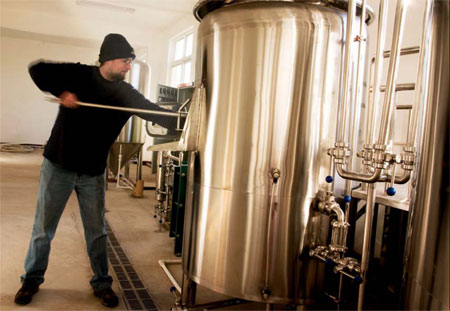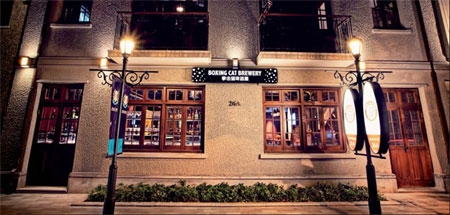Craft brews making headway
Updated: 2012-01-20 10:26
By Yao Jing (China Daily European Weekly)
|
|||||||||||
As with the wine market, Chinese tastes are diversifying in the search for premium beer and established brewers and new microbreweries are slowly gaining a foothold in the nation's food industry
On the first Thursday night in January, customers were packed into Home Plate BBQ in the Sanyuanqiao neighborhood of Beijing like a pod of whales stuffed into a glass fishbowl. A young man with a bulky messenger bag walked up warily to the entrance.
"Is it even worth it?" he asked. "It looks like there isn't any space."
 |
|
Above: Slow Boat Brewery's plant in Beijing provides different styles of beer such as American pale ale and Pacific Northwest red ale. Below: One of the Boxing Cat Brewery restaurants in Shanghai, where consuming craft beer is growing in popularity. Photos Provided to China Daily |
Customers were indeed flowing in and out of the budding restaurant that dishes up American barbecue, but not simply because of the food. That night, the buzz was about Slow Boat Brewery, a micro-brew operation based in the capital that had collaborated with the restaurant to serve three styles of beer: an American pale ale, a Pacific Northwest red ale and an oatmeal stout.
"Last time we teamed up with the guys at Home Plate, we ran out of kegs," says Slow Boat Brewery co-founder Chandler Jurinka. "This time, we brought more."
The scene at Home Plate could be seen as a loose representation of the emerging premium beer market in China: Throngs of expatriates gathering loudly at a bar or restaurant and rejoicing over their discovery of handcrafted beer that tastes like home in a country dominated by inexpensive and light beer from Chinese brands such as Tsingtao or Yanjing.
 |
Throughout cosmopolitan cities of China - where brands like Carlsberg and Heineken have become ubiquitous and a growing number of premium foreign and domestic beers are lining bar and store shelves - microbrews are on the rise. As with the wine market, Chinese and foreign tastes are diversifying, and the beneficiaries have been not only bars and restaurants, but established beer brands and new microbreweries that are slowly gaining a foothold in the nation's food industry.
"We see enormous potential for craft beer in China," says brewmaster Michael Jordan, 39, who makes beers for the Boxing Cat Brewery in downtown Shanghai.
China is the biggest beer drinker in the world because of its population, with 44.7 million kiloliters of beer consumed in 2010, or about one-quarter of the global beer consumption. That figure has grown for eight straight years, according to Kirin Holdings Co Ltd, a Japan-based company. Consumption of premium beer in China is estimated to grow 12 percent annually through 2020, according to Asia Pacific Breweries.
Many brands, such as Stella Artois, are taking advantage of the massive but emerging market for premium beer. The Belgium company recently introduced a beer with a lower alcohol content in China.
But while Stella Artois steers toward the light-tasting route, many breweries, such as Boxing Cat, are launching into more full-bodied beers with a greater complexity of flavors. Some beers, like Slow Boat's American pale ale, are thick, bitter but nutty in flavor.
And though craft brews are more expensive than commercial beers (a pint from a microbrewery will run about 50 yuan, or about 6 euros, while a can of Tsingtao costs 4 yuan), microbrews are earning a reputation from both Chinese and foreign consumers as quality brands that pursue a high-quality, handmade beer.
As one of the first craft beer brewers in Shanghai, where consuming beer is growing in popularity, Boxing Cat Brewery has one brewery and two restaurants, employing more than 80 people. Founded in 2008, the company sells about 260 kegs a month (one keg roughly equates to 100 pints of beer) and have a daily turnaround of about 240 customers at each of the restaurants.
Jordan, who attended the University of Portland in Oregon and studied life sciences, said he saw the enormous potential for premium beer when he visited Shanghai two years ago. He immediately quit his job as a brewmaster in Denmark for the promising and unfolding opportunities of producing the frothy beverage in China.
Jordan soon took over as brewmaster at Boxing Cat after his predecessor, Gary Heyne, died in May 2010. Last year, the company produced about 30 different types of beer. At 4.5-percent alcohol, the pale-golden lager Right Hook Helles is its most popular and best-selling variety - the company sells about 60 kegs every month.
"We produce six varieties of beer at any given time. We have four flagship brands and then rotate with a seasonal beer," Jordan says.
He says that because some Chinese customers are not familiar with its beers, Boxing Cat's main customers are foreigners. There is, however, a growing interest in craft beer from locals.
For Jordan, the biggest hurdle is to educate Chinese customers about the possibilities of beer and the flavors.
"There are more than a hundred different styles of beer. Each beer has its own unique flavor and history. And at the same time, there is an opportunity to educate Chinese consumers about pairing beer and food," the brewmaster says.
Wan Wan, 31, a training manager with a fashion company in Shanghai, first went to Boxing Cat with her friends in 2008 and now frequents the restaurant.
"I am not a beer expert, but I think there are many choices there and each one is just like made for special customers," Wan says.
Jordan says the most glaring difference between handcrafted and commercially produced beers is the strict standards among microbreweries. He says he makes his beer in small batches, using his own recipes, brewing procedures, yeasts, fermentations, carbonation and filtration.
To some extent, Slow Boat has moved one step ahead. It will begin distribution to Union Bar and Grille in the swanky Sanlitun neighborhood of Beijing, Home Plate BBQ and two other restaurants in the capital by February.
"Sales from craft beer for the day make up almost half of our alcohol sales and exceeds both our liquor sales and our domestic draft beer sales," says Adam Murray, co-owner and chef at Home Plate. "Most of our craft beer sales come from expats. The Chinese that drink craft beers tend to be those who have spent time studying or working overseas so they are more familiar with the product."
Based on increasing interests among Chinese customers, Home Plate is working with Slow Boat to serve its handcrafted beers on a permanent basis after Spring Festival, which falls on Jan 23 this year.
"We plan on carrying two of their beers but will change the style of beer depending on the season," Murray says.
In 2011, Slow Boat produced five beers; this year, it will produce an additional seven types of beers. Many will be seasonal beers such as Christmas Ale and Maibock, while others will be beers that Beijing has never seen before, Jurinka says.
"Most expats have already been introduced to craft beer in their home countries, however, more and more Chinese are trying and enjoying our beers," he says.
Jurinka says he also has plans for a bar in Beijing that features all of his beers on tap.
"I have no doubt that craft beer will expand outside of first-tier cities and we hope to extend to other cities, but it will be some time before that happens," he says.
He believes imported bottles of craft beer will soon make it to second- and third-tier cities. Boxing Cat, on the other hand, is more interested in making headway with educating customers. Jordan says it is important to allow Chinese people to embrace craft beer over an extended period of time.
"We have had three different craft beer festivals in Shanghai during 2011 to educate customers," says Jordan, who adds that Boxing Cat is working with several micro breweries in Chinese first-tier cities to form the China Craft Beer Association to have larger beer festivals in Shanghai and Beijing.
And don't think that Chinese brands are not paying attention. Confronted with competition from increasing number of foreign brands, Chinese brewers have introduced premium beers of their own, such as Tsingtao Brewery's Augerta and Yipin as well as Supra White Beer by Zhujiang Brewery.
Today's Top News
Rescuers race against time for quake victims
Telecom workers restore links
Coal mine blast kills 18 in Jilin
Intl scholarship puts China on the map
More bird flu patients discharged
Gold loses sheen, but still a safe bet
US 'turns blind eye to human rights'
Telecom workers restore links
Hot Topics
Lunar probe , China growth forecasts, Emission rules get tougher, China seen through 'colored lens', International board,
Editor's Picks

|

|

|

|

|

|





